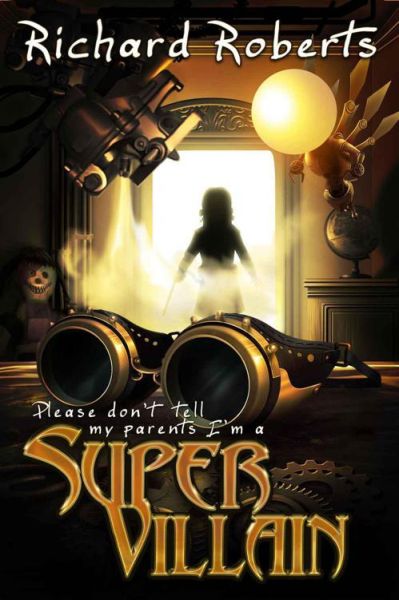Don’t Tug On Superman’s Cape
Please Don’t Tell My Parents I’m a Supervillain (Please Don’t Tell My Parents, volume 1)
By Richard Roberts

1 Dec, 2022
2014’s Please Don’t Tell My Parents I’m a Supervillain is the first volume in Richard Roberts’ Please Don’t Tell My Parents superhero series. Although superhero might not be quite the right term.
Penelope “Penny” Akk is the daughter of superheroes “Brainy” Akk and The Audit. She is understandably frustrated that thus far, she has failed to manifest either her mother’s superlative analytic abilities or her father’s superhuman intelligence.
At age thirteen, Penny is going to get what she wished for, if not exactly in the form she might have wanted.
The first manifestation of Penny’s power comes when she constructs the Machine, a powerful mechanical device that can recycle anything. Penny is a super-genius inventor … of sorts. The catch is that Penny enters a fugue state when in the clutches of inspiration, so don’t count her being able to fix or recreate any of her inventions.
Penny’s best friend, Claire Lutra, is the daughter of a retired supervillain and like Penny, frustrated that she has not manifested superpowers. One fugue later and Penny presents her friends with a superpower-triggering serum. Both Claire and another friend, Ray Viles, quaff the potion: Claire gains mildly enhanced physical abilities and disarming cuteness, while Ray gains speed and strength.
The next obvious step is to adopt identity-concealing costumes and cognomens, before establishing themselves as LA’s newest superheroes. Mistakes are made. The trio do establish themselves… as the Inscrutable Machine: Bad Penny, E‑Claire, and Reviled, LA’s newest trio of kid supervillain wannabes.
With two genius parents, it seems only a matter of time before the trio’s identities are revealed. Here fate is kind: not only is Claire’s mother, the former Minx, perfectly happy to support her daughter and friends in whatever career choices they make, misleading evidence steers the Audit and Brainy Akk in entirely the wrong direction. Certain that they know what’s going on, they ignore the budding supervillain under their noses.
The kids have the time needed to reestablish themselves as misunderstood heroes. Alas, super-intelligence is not the same as super-wisdom. What the three young teens actually do is engage in a series of escalating escapades whose ultimate effect is establish them as very promising criminal superhumans.
It’s not surprising that LA’s supervillain community takes a close interest in the teens or that its greatest mastermind, the Spider, begins to consider the best use of Bad Penny, E‑Claire, and Reviled.
~oOo~
Penny’s superpower reminds me of Gallegher, a Kuttner character, except that Penny does not have to get drunk to experience creativity-filled blackouts1. She does seem to have an untoward laugh:
“HA! AH HA HA HA HA HA HA!”
Supervillainy might be leaking into her regular life. Is this another case of Malign Hypercognition Syndrome?
I wonder how many supers get stuck with stupid names because of poor life choices when their powers first manifest2?
Speaking of poor life choices, the plot of this novel is driven by the idea that intelligence is a single term for many things, that being particularly adept in one kind of intelligence won’t keep one from being a complete knucklehead in other areas. Thus Penny’s parents’ inability to connect Bad Penny with their daughter Penny. Thus Penny’s own inability to notice when someone is smitten with her.
Don’t Tell presents a conventional Silver Age superhero universe. For the most part all sides agree to follow certain conventions, no doubt because not following them has unfortunate consequences. Thus, people scuffle to overpower but not kill their opponents3 and the average person on the street doesn’t have to worry overmuch about being reduced to a slurry. Readers don’t have to worry that the author will suddenly decide to get serious and decapitate one of the Inscrutable Machine.
Don’t Tell My Parents (…) is a competent superhuman teen comedy, with fairly low stakes and endearing characters. I am not sure just how sustainable the concept is, although I notice that hasn’t stopped the author from producing at least four sequels and at least three related books. If someone enjoyed Worm but wanted something less relentlessly grimdark, this is probably what they are looking for.
Please Don’t Tell My Parents I’m a Supervillain is available here (Amazon US), here (Amazon Canada), here (Amazon UK), here (Barnes & Noble), here (Book Depository), and here (Chapters-Indigo).
1: Penny’s blackouts have a narrative advantage for the author; no need to explain how his protagonist’s inventions work.
2: Penny started off as the Inscrutable Machine, before the adults decided that the name had to refer to the group as a whole and their impeccable teamwork.
At least Generic Girl won’t have any trouble changing her name, when and if she decides to. Because she eschews publicity, few people have any idea she exists, let alone what name the other superheroes have pasted on her.
3: Adherence to conventions of non-lethal hand-to-hand conflict won’t stop bullets from killing the armourless teens, as Penny belatedly realizes.
